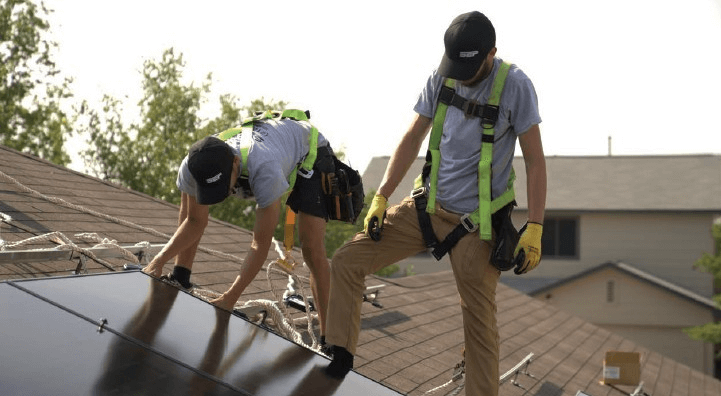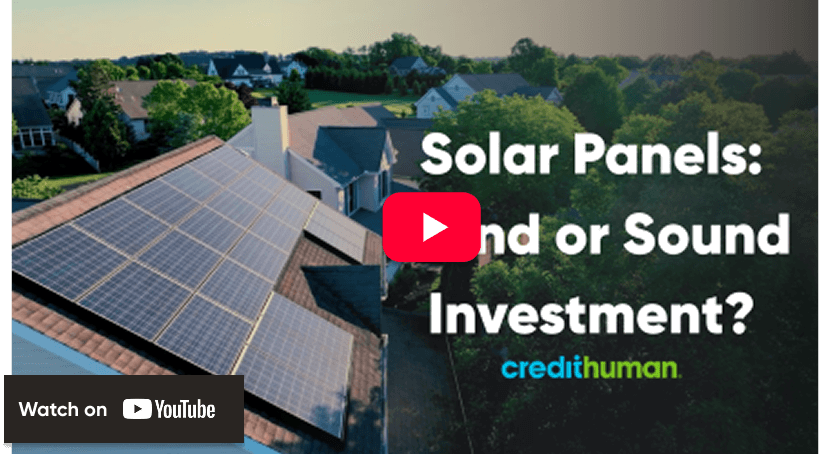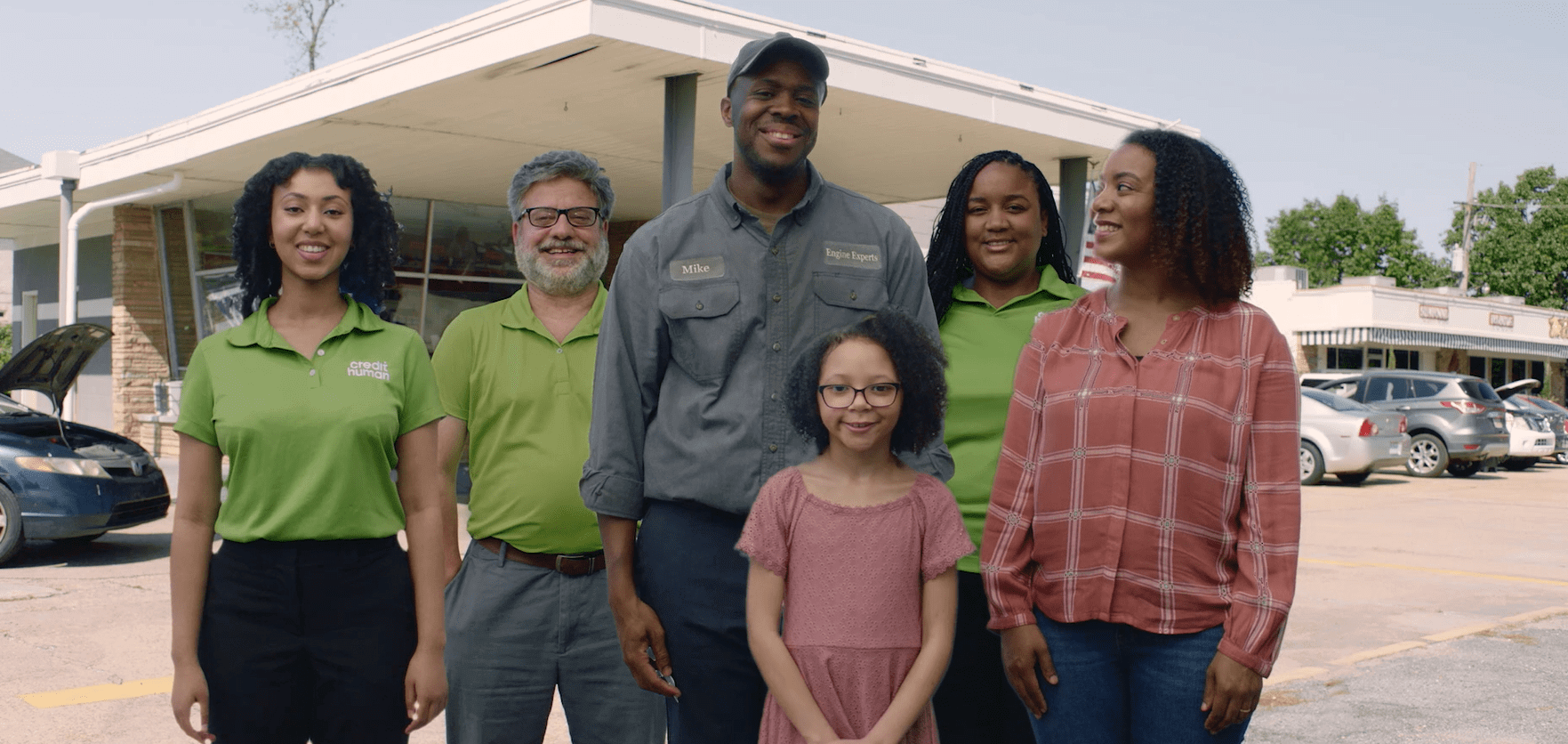Solar panels: trend vs. sound investment
Understand the personal and community impact of going solar

At Credit Human, we’re not just hopping on trends, we’re making valuable investments and helping our members do the same. Solar panels are not just a savvy money choice. Solar technology can change how you live, work and have fun.
Solar energy can reduce electricity bills and raise a home’s value. However, the benefits extend beyond just saving money. Cleaner energy means cleaner air for you, your family and your community. It means fewer smoggy days, healthier lungs and a safe environment for kids to grow up in.
By embracing solar energy, we’re helping preserve natural habitats, protect biodiversity and combat climate change, ensuring a livable environment for generations to come.
How does going solar make the world a better place?
Solar energy in the United States is growing fast. Since 2000, the country has installed over 248 gigawatts of solar power. That’s enough energy production to run more than 41 million homes. As the fastest growing renewable energy source, solar energy isn’t a trend, it’s a viable power source to fuel our cities and homes.
Financial benefits
Solar can help lower your monthly electric bills, and in many places, you can get paid (via monthly statement credits) for extra energy your system sends back to the grid. Homes with a solar panel system also tend to sell at a higher price point—on average about $15,000 more according to a Lawrence Berkeley National Lab Study.
Even better? When more homes go solar, entire communities benefit. A recent study Synapse Energy Economics1 found that local solar adoption can save regions over $1.1 billion, freeing up resources for schools, safer streets and affordable housing.
Environmental impact
Every solar-powered home helps reduce harmful emissions, improving the air we breathe and the water we drink. In fact, one single solar home can prevent 3-4 metric tons of CO₂ emissions each year. That’s the same as planting over 100 trees annually, meaning cleaner air, access to fresh drinking water, healthier ecosystems and a future we can feel proud to pass on to future generations.
Is solar a good fit for me? Here are 3 key factors to consider.
- Look at your energy use patterns.
A good starting point is to review electricity usage over the past year. By averaging monthly total costs and dividing by the number of days in a month, it’s possible to estimate daily energy needs.Average monthly usage ÷ Average days in a month = kWh per day
- Determine your sunlight availability.
Solar panels can’t produce power without sunlight, so it’s important to determine the amount of “peak sun” a home gets. For example, northern and western parts of the United States get approximately 4 hours of peak sun, while southeastern states can average 5-6 hours.
This formula helps assess whether a solar system can meet energy needs based on local sunlight conditions.kWh per day ÷ Peak sun hours = kWh needed
- What kind of return on investment should I expect for solar?
Also known as the solar payback period, return on investment is how long it takes for energy savings to cover the upfront costs of the system. On average, the solar payback period for homeowners in the U.S. is roughly seven years. After that, the electricity generated is essentially free for the remaining life of the system which is often 25+ years.
For example, if a solar system costs $18,552 and generates $2,613 in annual electricity savings:Payback period = $18,552 ÷ $2,613 ≈ 7.1 years
What does the process of going solar look like as a homeowner?
The video below shows the journey of an actual Credit Human member going solar in San Antonio, TX.
Bonus questions to ask when going solar
How can I pay for solar panels?
The most popular way to pay for solar panels is by financing with a loan. In general, credit unions tend to have the lowest interest rates on loans vs going through a bank. At Credit Human, we not only give you a competitive rate for solar loans but will also connect you with a dealer that has passed our rigorous standards for excellence.
From there, we recommend getting quotes from multiple approved dealers and choosing the one that best fits your needs, whether that’s based on pricing, service offerings, installation timeline or overall vibe. Every homeowner is different, and your dealer should align with your goals and expectations.
Do solar panels take a long time to install?
From the moment you say “I want solar” to the day panels are powering your home, the average timeline nationwide is about two to three months. In areas with slower permitting or high demand, it can stretch to four to six months. The physical installation of the panels typically can be done in less than three days with final inspection and connection to the grid taking up to two weeks.
Where can I buy solar panels?
Many people decide to go with a trusted professional for the purchase and installation of their solar panels. Choosing a solar dealer is a big decision—but it doesn't have to be a stressful one.
Most people have a good experience finding a provider through a regular internet search for providers in their area, but like other fast-growing industries, the solar energy trend has opened the door to a small number of consumer solar scams.
- Pushy sales tactics or aggressive sales pitches
- Pressure to “act quickly”
- The installer does not provide an electrical license within the state of installation
- Offers claiming to provide “free” solar panels or other services
Need help finding trusted solar professionals that have been vetted to meet rigorous standards and criteria?
You can request a list of Credit Human approved dealers in your area by contacting us online or visiting your closest Financial Health Center. You don’t have to be a member of our credit union to inquire, and all dealers have a strong market reputation, commitment to sustainability and proven workmanship and customer service.
We won’t refer a specific dealer to any member, but we do guarantee that every dealer in our program has met our rigorous partnership criteria. This means you can move forward with confidence, knowing you’re working with professionals who share our values and meet our standards.
We're here when you're ready
We believe financing should be simple, supportive and tailored to you. That’s why we’ve built a system that puts people first. Because when you succeed, we succeed. We don’t hide behind automated systems or endless phone menus. When you call us, you’ll speak with a real person—someone who’s knowledgeable, responsive and ready to help.
Once you’ve done your research and feel confident about moving forward, contact us. Our team is here to guide you through the financing process, answer your questions and make sure everything goes smoothly from start to finish.
Before you go, learn more about our commitment to sustainability and 5 home improvements to save money.
1Synapse Energy Economics. (n.d.). New England solar savings. https://www.synapse-energy.com/new-england-solar-savings




